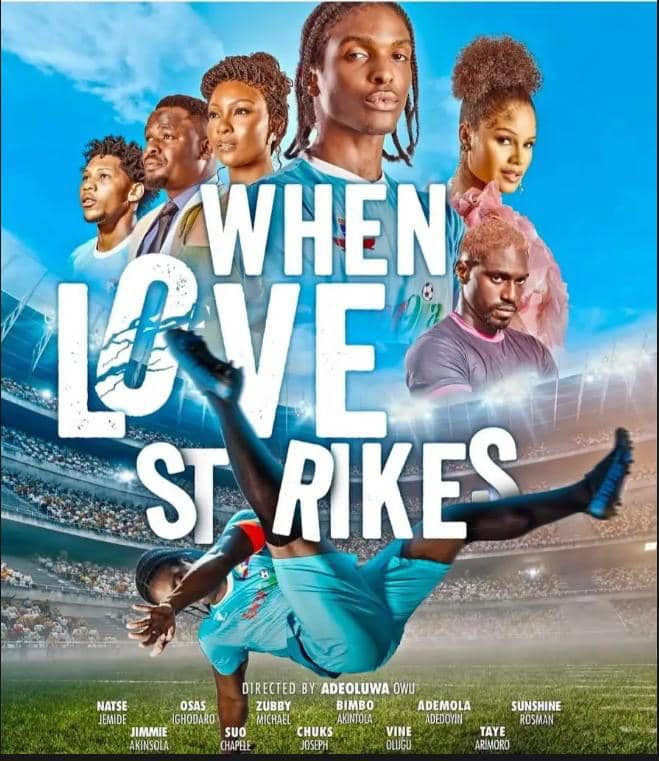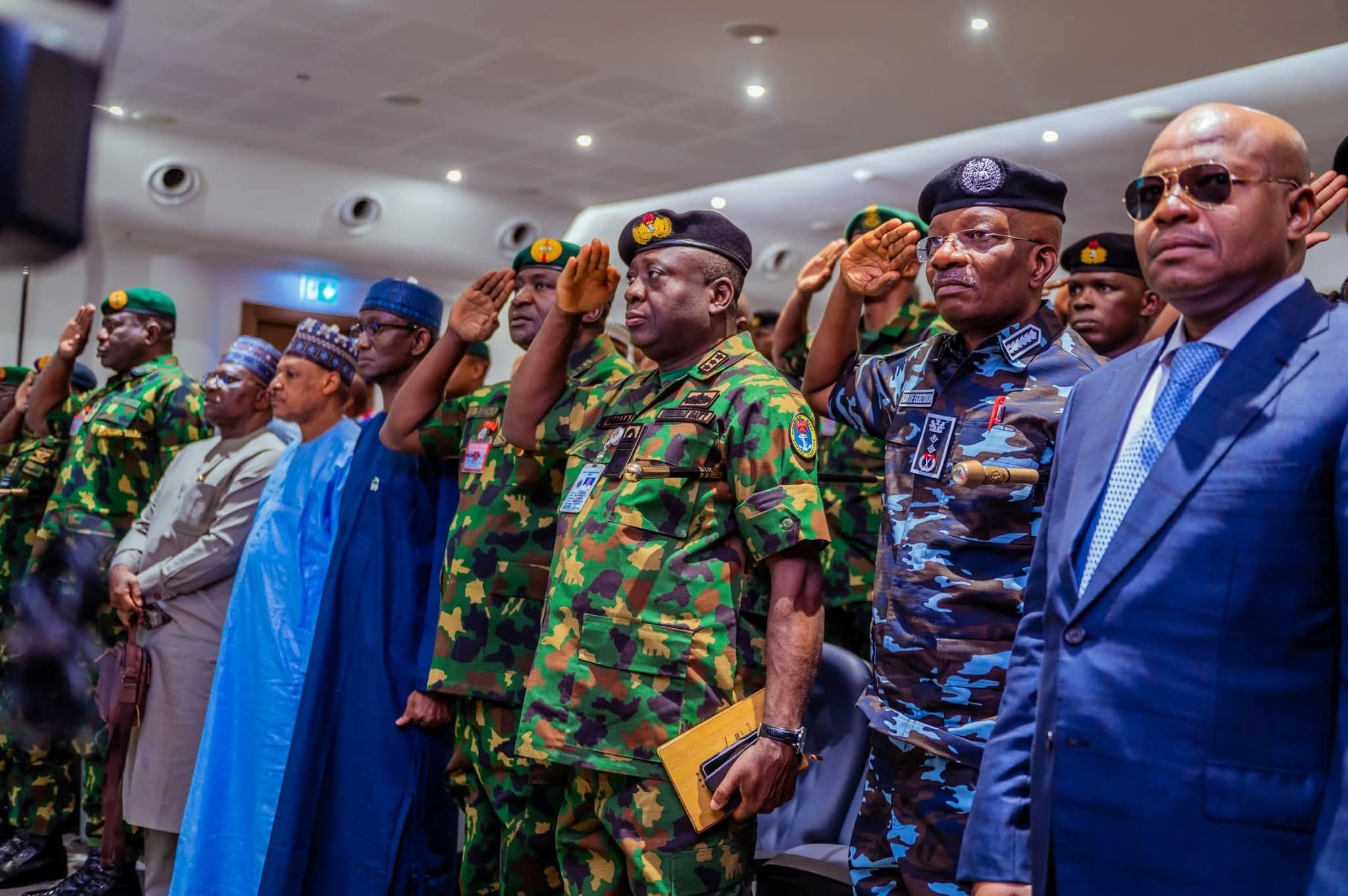By Amadi Chimaobi Kingsley
A pleasant surprise to when this movie was released as we were just introduced to Uche Jombo’s self-directed *Onye Egwu * which was released earlier this year on Prime Video; in fact, when Zubby Michael pops up on the screen in the opening scene, I half expected that we were being treated to a sequel as he reprises a similar role. Which has now been added to the catalogue of football themed films like Yemi Morafa’s Funke! and Tunde Kelani’s Maami.
When Love Strikes comes across as a revision of Onye Egwu. Both films possess similar premises, complications, and characters. There is Ibukun Saka, played by a convincing Natse Jemide, a talented youngster looking to further his football career by making it to Europe. He faces an obstacle in his mum (Bimbo Akintola), who wants him to take a better bet by trying for a scholarship to school in Cyprus, while a retired footballer (Zubby Michael) is on the lookout for the next Nigerian football star.
However, the Adeoluwa Owu-directed effort distinguishes itself by adding more layers to its plot, depicting themes like a coming-of-age story, family drama, and a bit of romance. Also, with more subplots than a Tyler Perry film, When Love Strikes presents an Inkblot signature style of multiple narratives that are not properly synchronised to form a rounded whole and never really focus on anything. We end up with an eclectic depiction of story details that belie the title and have little impact on the direction of the plot.
The film is titled When Love Strikes, but in the details of the plot and action, romance clearly takes a back seat compared to other themes explored in the dramatic action. More poignant in the film is the dysfunction in the Saka family. Ibukun wants to win the Youth Challenge Cup and further his career to honour his supposed father’s memory, while his mother would rather, he focusses on his education, but it turns out the people he has always known as his parents are not really his parents. His life is turned upside down just before he must take a life-defining decision, as his motivations and intentions are strongly challenged. While he does fall in love with Ngozi (Shine Rosman), Nnamdi’s daughter, it is a tangential detail to the story and is not the love that strikes.
A more poignant romantic relationship to explore would be the relationship between his sister Tinuke (Osas Ighodaro) and her childhood lover Tjay (Ademola Adedoyin), maybe then love would have struck.
The under-exploration of the several competing subplots, character relationships, and neglect of subtextual details in the action takes away the edge from the story and sometimes makes the characters’ actions look out of sync. Instead of evoking strong emotions, important scenes arrive anticlimactic and miss their mark due to subpar handling. As a result, the dramatic action does not build up convincingly to the climax of the film.
When Love Strikes features good visuals, as expected from cinematographer Barnabas Emordi, while editor Ates Brown delivers commendable film editing. One standout cinematographic choice significantly enhanced Bimbo Akintola’s performance, which was a highlight of the film. The decision to slowly zoom in from a wide shot to a medium close-up of Bimbo heightened her emotional reaction beautifully, allowing the audience to connect more deeply with her character’s experience.
Additionally, the incorporation of a memorable football chant into an upbeat afrobeat tempo contributed to the film’s overall atmosphere. This effective blend of sound and visuals elevated key moments, showcasing the potential of technical choices to enhance storytelling in cinema.
One is the unprofessionalism of the so-called commentators. Their commentaries appear watered-down, a bit flippant, often drifting towards a random radio football banter. It is particularly irritating that the female commentator constantly picks on Ibukun, doubting his abilities and berating him on air
There are other glaring storytelling parallels in When Love Strikes and Onye Egwu that make the Owu-directed film seem like a reordering of its counterpart. One aspect is the reference to the storied, stereotypical modern African parent who prefers that her child, especially the male, prioritizes his education over other promising opportunities that are not directly tied to academic qualifications. Because many African parents have been partially exposed to Western education, they perceive it as the only genuine gateway to prosperity and success while considering careers in sports and the entertainment industry volatile and less consequential. Even the uneducated folks believe that careers in science-related disciplines such as engineering and medical science, as well as a select few quasi-artistic disciplines, such as Law, come with prestige and guarantee a fulfilled life. This is evident in When Love Strikes where Mama Saka, played by Bimbo Akintola, tries to cajole Ibukun into forfeiting his football passion for an academic scholarship. In Onye Egwu, Nedu’s mother does not value her son’s interest in football. These mothers, however, want the best for their sons despite their skepticism and overprotectiveness.
Most times, before the interference of outsiders, family and friends provide the best support system for ambitious people. Onye Egwu shows this in the amount of help that Alex and Nedu receive in their career journeys. Similarly, Ibukun in the Inkblot production gets the confidence of his sister Tinuke (Osas Ighodaro), friend Ebuka (Chuks Joseph) and girlfriend Ngozi (Shine Rosman) despite challenges like the frequent bullying from rival Jason Okpara (Vine Olugu). While Nedu’s humble, impoverished roots contrast sharply with Ibukun’s middle-class background, both are exposed to the pressures and obstacles that come with their aspirations for global sporting glory.
Unlike Jombo’s films, humor is not a major foray in When Love Strikes. It is sparsely used, with the filmmakers being more focused on delivering drama, peeling truths and rousing emotions. Yet in trying to achieve this, a few episodes detract from the plausibility of the film… Another unreasonable part of the plot is the reunion of Tinuke and Tijani (Demola Adedoyin), which happens seamlessly as if they have only been apart for a few years—with the insinuation that they have not had any other serious lovers since their breakup. Surely, waltzing back into the life of a partner after twenty years cannot be that easy.
Another aspect in which When Love Strikes distinguishes itself from its close cousin, Onye Egwu, is the production quality. While the actions on the pitch definitely look rehearsed, the cinematography leagues above, delivering well-timed shots from angles that give the action a semblance of spontaneity, thereby enhancing its dramatic essence. While When Love Strikes is not the first Nigerian football-themed film and might not have done enough to become a classic,it is a more enjoyable watch than most of the recently produced Nollywood sport-themed movies, boating more substance and better attention to production quality.
When Love Strikes makes a commendable attempt at a sports drama but struggles to fully draw its audience in. The football scenes are a highlight, sparking excitement and collective reactions in the cinema. While Ibukun Saka’s journey is designed to be the emotional Centre, the film doesn’t fully succeed in making the audience feel his struggles on a deeper, more personal level. Instead, it leaves them observing his challenges from a distance, evoking pity rather than a genuine emotional connection that compels them to root for him.
Instead of creating genuine suspense, these cinematic devices come off as an attempt to mimic Western storytelling, rather than embracing a style that speaks to the film’s local context and viewers. As a result, the tension feels forced, and moments meant to be serious or high stakes end up drawing unintended laughter, which suggests a misalignment between intention and execution.
The cast delivers strong performances, but the character development feels uneven. While Ibukun shows some growth, his decisions toward the end feel forced, making his journey less believable. This is echoed by Zubby Michael’s character, who calls out Ibukun’s lack of serious sentiment the audience shares.
Despite its flaws, the film does provide an intimate glimpse into the dual pressures faced by Nigerian footballers, both on and off the field. Through Ibukun’s journey, we witness the nuanced challenges that resonate deeply with many, especially regarding the themes of ambition, family expectations, and societal pressures.
I rate it a 6/10, it’s a perspective that holds potential for greater exploration, but one that ultimately feels somewhat diluted by the film’s execution. Also, unambiguous fact about When Love Strikes is that it doesn’t set out to impress with grand gestures, melodrama and overblown production values. But then, it badly wants to leave an impression about how beautiful games are perceived in this part of the world. Kept simple and niche, the narrative appeals to sports enthusiasts in the country and joins the canon of sports drama in Nollywood. However, its limited vision and storytelling foibles diminish its candidature for cinematic excellence.












Leave a Reply